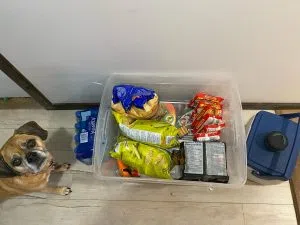As Hurricane Fiona bears down on Canada’s east coast, Nova Scotia residents like Catherine McNutt are getting ready to weather the storm.
McNutt moved to Nova Scotia about a year ago from Ontario, and said this will be her first experience with a hurricane.
It’s “causing a little bit of panic,” and disrupting the otherwise laidback, slow-moving and easygoing culture of the east coast, she said.
On Friday morning, McNutt said she and her partner received emergency alerts about the incoming storm. For the past six days, she and most of the east coast have been monitoring weather reports closely.
Weather is a lifeline in the Maritimes, McNutt said.
“Everybody watches the weather, because it’s not like when I was in Ontario,” McNutt explained.
McNutt’s dog, Wilbur, alongside some of their supplies for the storm — including their “storm chips.” (Catherine McNutt/Submitted)
“It could say that you’re going to get 25 centimetres of snow, and then two days later, it’s nice and warm and sunny.”
Knowing that anything could happen over the coming days, McNutt said she and her partner went out on Thursday to buy emergency supplies.
“Yesterday was pretty chaotic at the grocery store, and at Canadian Tire and Home Depot,” McNutt said. “Everywhere we went was a lot of people just doing the same things as us.”
While she said most people seem to be used to “big, bad storms” in Nova Scotia — the province certainly experienced a rough winter this year, she shared — McNutt thinks this one might be a bit different.
She said weather reports are predicting Fiona could be worse than Hurricane Dorian, which was one of the worst storms Nova Scotia ever endured when it hit in 2019.
“Everyone’s kind of a little bit more worried about this one,” she said.
Surprisingly, TikTok has been a valuable resource for McNutt. She said her family typically gets weather updates from a popular online personality, Frankie, who encouraged them to stock up on “storm chips” before the hurricane makes landfall.
“We made sure that we have enough bags for five days,” McNutt said, laughing.
In addition to the essential chips, the pair have stockpiled enough food to last about five days, lots of extra batteries, a few disposable two-hour grills they can use in their garage to cook, a gas stove, and extra light sources.
“Realistically, all we can do is be as prepared as possible. And if things start flooding, then we start bailing it out,” McNutt said with a chuckle.








